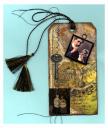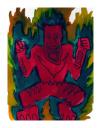Possible spoilers for The Golden Voyage of Sinbad, so ahroo!

Standing before the doors to the haunted house, My Mirage whispers to myself. “Before you can be granted admittance, you must uncover the identity of the wicked magician.”
I think about what kind of items I might need should I manage to get inside. The haunted house could be hazardous!
The goddess Athena once said to me in a dream, “You must take up a sword.” I thought that was preposterous, since I don’t do swords. A year later, in a waking dream, the unknowable explained to me she meant a pen. I was just too dense to understand her.
I’ve been writing and drawing all my life, but I begin to get it, faintly. I need to take up the pen and write and draw with intent. I must take action. It is no longer enough for me to do it unconsciously. I have been doing it more consciously the last two years. However, I need to know this as well as do it with intention.
I try to decipher the symbolism behind the slapstick, the torch, the wand. I’m carrying not so much a stick as a feminine spirit lent to me by the Dark Goddess. I’m performing not so much the part of Punch as a generic dum-dum on a ridiculous adventure.
While thinking about the past, Xtine pulls free another stone to reveal more me (without consciously realizing it). In a way, in another time and place, I had a puffed up image of myself as the Grand Magician. I thought I knew what I was doing. Much as Koura the wicked magician in The Golden Voyage of Sinbad. Alas, as Xtine points out this guy is so way not eating with both hands.
I wonder about the man in black who follows Koura around. We are meant to think of him as the sensible apprentice to Koura. He certainly knows what is what. “If you continue on this way master, you will die.” Then I think of the oracle’s words about an evil son and wonder who the oracle is talking about – Koura or the “apprentice?” We are supposed to think Koura, of course, but when you are on a ridiculous adventure, layered meanings can spring from anywhere.
I’m thinking about an old Batman and Robin comic, where they fight Benedict Arnold. The old traitor comes back from the dead to break the soul of the country by defeating two of its greatest heroes. A weird dude follows him around the whole time, granting Benedict Arnold powers. Only at the end when the traitor is defeated does the weird dude reveal himself to be Old Scratch (the Devil).
So is that “apprentice” dude really an ordinary guy hoping to advance himself by serving the bad guy, or is he symbolic of the possession of Koura by an evil force? Thinking about it, I decide that on a symbolic level he must represent what is left of Koura’s conscience. He is always the “sane” bad guy, trying to get Koura to be more reasonable, more down to earth.
It is telling that the apprentice is ordered away near the end of the film – Koura has the upper hand (or so he believes) and he no longer needs his “conscience” to keep him alive – indeed, soon after he goes off on his own, Koura starts to die rapidly as the dark magics finally catch up with him!
But me? No way, not no how. Couldn’t happen to me! Like Koura, I thought I was getting the forces of the world to move at my whim. Kali gettin’ down for me? Har! That’s Shiva, dumb-butt, and your face is about to be used as reactor shielding.
Then I get it. Koura was the sultan (read: king). He “killed the sultan” (who always seems to be referred to in a present sense, as if he were still alive somehow), in the sense that he killed himself with his pursuit of dark magic. Much as Saruman in Lord of the Rings. The desire for knowledge can lead too far. Always remember to practice don’t-know-mind!
SNACK!
Koura lived in the castle next to the city because he was the king who had gone bad. The fiery accident that burned the good vizier (read: the apprentice king) happened during Koura’s fall from grace as the true king.
This is a blow to me. I always wondered why “the demons of darkness” (read: the forces of nature) moved to Koura’s command. That’s because he was still manifesting the king energy, even though it was for wicked purposes.
Thanks to Xtine, I realize now how little grasp Koura has on reality. Before, I thought he was just some power monger meddling and paying the price to accomplish his evil goals. But whoa, that’s just what he wants people to think. Total illusion pose for the crowd. In truth, he is out to lunch big time. All lines are busy, no groove, don’t play. Not even on the same page.
That’s incredibly tragic. His quest then becomes not a mad scramble for power, but a compelling desire to reach the Fountain of Destiny and recover what was lost. He “obtains”, to use his own phrase, but only two out of three – the energy of youth and a shield of darkness. The crown of ultimate riches goes to someone else. You can never return to what you once were.
Koura isn’t thinking of the people of his kingdom, or his poor vizier’s suffering. He’s thinking of himself and not in a good way. Sinbad, who represents the transcendent function (he says, “I am the most foolhardy”), comes along to restore the balance and heal the wounds of the earth. He kills Koura in the fountain, and it is only then that the third golden tablet reveals the crown. The king is dead, long live the king.
A phrase comes back to me. “The hero who does not crucify himself today becomes the villain of tomorrow.” I’ve also read that the hero is an immature energy function, that it has a purpose (to take action against the stagnation of life) and once that purpose is fulfilled, the hero must “die” and be reborn as a responsible adult.
I think that must have been what I didn’t do a long while ago. Part of me has been skulking about like a ghost in dark moors and drinking of wretched waters. Joseph Campbell once said, “And where we had thought to slay another, we shall slay ourselves.” The four corners fall into place.
I grow afraid. My Mirage is waiting for me in the haunted house. The last thing I want to do is dispatch the vampire, defeat the villain, neutralize the monster. It’s the very worst thing in the world to slay yourself. Psychologically or otherwise.
The doors to the house open. I’m expected.




